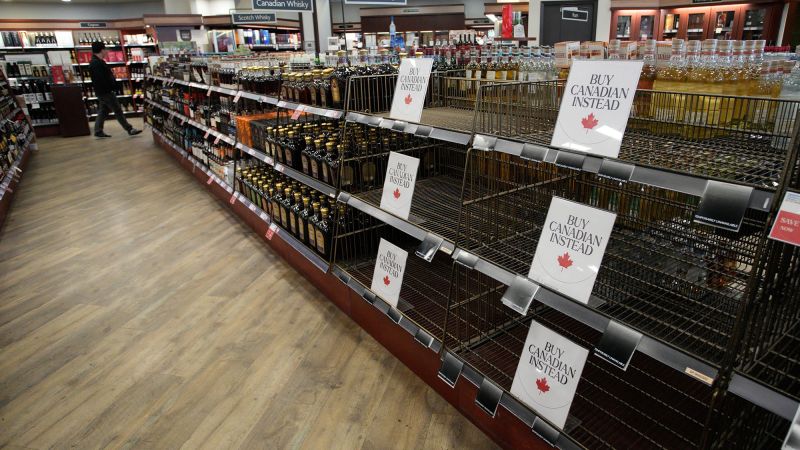
Virginia Distillery CEO Gareth Moore was bullish on his company’s American single malt whisky sales north of the border when 2025 kicked off.
But then demand crashed as the centuries-long friendship between the United States and Canada broke down amid bruised feelings over tariffs and President Donald Trump’s threat to make Canada the 51st US state.
“We were looking to triple the business. Instead, it collapsed to zero,” Moore told CNN in a phone interview. “It was almost like suddenly the whisky didn’t taste good because of where it’s from.”
Canadian officials went so far as to ban American spirits from their store shelves, a prohibition that still exists in many provinces today.
Virginia Distillery is hardly the only American business caught in the middle of the rocky US-Canada relationship.
“This was all about some ugliness that we’re not part of,” Moore said. “We’re not in politics. We’re just some guys in Virginia making good whisky. But unfortunately, we’re the victims.”
Canadian visitors vanish
It’s not just that Canadians are refusing or unable to drink American booze due to bans. It’s also that many are deciding not to visit the United States, dealing a blow to countless resorts and travel businesses that once relied on a steady stream of Canadian visitors.
On a normal year, roughly 70% of the daily golfers at the Bluff Point Golf Resort in Plattsburgh, New York are Canadians. Not this year.
“It’s been a dramatic drop. It’s very rare that we see someone pull in to play golf that’s coming from Canada,” said Paul Dame, owner of Bluff Point Golf Resort, which is located just 35 minutes from downtown Montreal.
Canadian visitors by land to the United States have plunged 31% so far this year through the end of September, according to the most recent data from Statistics Canada. Air travel by Canadians is down by 13%.
Bluff Point Golf Resort has responded by cutting hours and staff among its housekeeping crew.
“The tough thing for us is, it’s nothing we’ve done. We’ve worked hard to grow our business and lure folks who want to come across the border,” Dame said. “Canadians just aren’t happy. It’s not economic policy. It’s these hurtful things said about their country.”
‘We’re hunkering down’
Mark Collins, who was born and raised in Newfoundland, Canada, said Canadians have long treasured their friendship with the United States and the fact that the US-Canada border is the longest undefended border on the planet.
But earlier this year Collins, the CEO of Seattle-based ferry service Clipper Navigation, noticed a sudden drop in bookings from Canada into the United States. Ridership between Vancouver and Seattle has plunged 30% so far this year, the company said.
Collins said that while the currency exchange rate is always a challenge for Canadians visiting the United States, the “straw that broke the camel’s back” was Trump’s threat to make Canada the 51st US state.
“There is definitely a sense of national pride being offended. People said, ‘Well, if it’s going to be like that, I have a choice and my choice is not to travel to the United States,’” Collins said.
Hurt by a “grim” decline in cross-border bookings, Collins said his company has been forced to shrink its schedule sharply and lay off a quarter of its workforce.
Ironically, those layoffs have hit Clipper Navigation’s US workforce the hardest.
“We’re hunkering down. It doesn’t look like it’s getting better anytime soon,” Collins said.
Reluctance to visit the US
Executives say another factor behind the drop in Canadian visitors is concerns about the Trump administration’s aggressive border enforcement.
“People started feeling like it’s risky to cross the border,” Collins said.
Geoff Freeman, president and CEO of the US Travel Association, told CNN that some foreign visitors from Canada and other countries fear they will be detained or have their devices searched when going through customs.
“The perception is that travelers aren’t as welcome as they once were,” Freeman said. “The most important thing the administration can do is send a message to travelers around the world that the US is open to business to legal travelers.”
Freeman said the “big test” will come this winter when tourism hot spots in Texas, Florida and Arizona learn whether the Canadian visitors they’re dependent on will show up.
Jeff Quint, founder and CEO Cedar Ridge Distillery in Swisher, Iowa, was forced to abandon the European market during the first Trump administration due to trade tensions and retaliatory tariffs imposed on American spirits.
Cedar Ridge Distillery refocused instead on Canada, shipping aggressively into Ontario and other provinces. That shift paid off – until this year when some Canadian provinces banned American spirits.
“You hate to invest in a market for two to three years – and then have to bail out of it,” Quint told CNN.
Exports of American spirits to Canada plunged by 85% in the second quarter, according to the Distilled Spirits Council of the United States (DISCUS).
The good news is that trade threats between Ottawa and Washington have eased a bit in recent months.
During an Oval Office meeting last week with Canadian Prime Minister Mark Carney, Trump joked about a “merger” of the two countries but also praised his counterpart as a “world-class leader.”
Quint is hopeful that after years of turbulence, the global trade picture clears up soon.
“These tariffs create a level of uncertainty that is paralyzing,” he said. “We just want to know what the rules are. This lengthy period of instability isn’t good for anyone.”